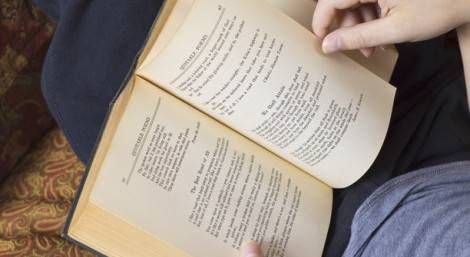
How To Read Poetry And Actually Enjoy It For National Poetry Month
Poetry. It’s usually a love-it-or-hate-it proposition, which is really unfortunate. People get burned out on the way it’s taught in school, I know–wracking your brain to try to figure out the metaphors and the rhyme scheme and the meter (this one is especially tricky because the meter isn’t necessarily written in stone for some pieces, and some have fluid meter and some have no meter at all, and anyway how are you supposed to know which words the poet would have emphasized?) takes some of the magic out of just sitting down and enjoying a poem. Poetry feels intimidating with all of these factors thrown in; it feels like something you can’t enjoy if you aren’t an expert.
Poetry is, in that respect, a lot like wine. There are many different levels of appreciating wine, and not being a sommelier who can pick out which Italian estate your wine came from by nose alone doesn’t mean you can’t knock back your favorite bottle and peacefully enjoy it. This is for you alone and you get to dictate what enjoyment means.
Don’t feel like you need to analyze poetry to enjoy it. I mean, if you like analyzing poems and that’s how you enjoy them, by all means, do–you’re probably not the audience for these tips, though. For the rest of us, that “I don’t feel smart enough to do this” factor can really be a dealbreaker, but it doesn’t have to be at all.
Case in point: a lot of us listen to popular music, which has lyrics. Lyrics that may or may not be esoteric. Lyrics that are steeped in metaphor sometimes and have double meanings. We connect to these lyrics because they speak to our human experiences, even if we don’t always 100% understand all of them. My husband and I differ wildly on what we think the song “Blue Monday” by New Order is about, but we both feel the intended bitterness and sarcasm that comes across in lines like “But I’m quite sure that you’ll tell me / just how I should feel today.”
I like to read poetry like that. Maybe I don’t get all of the references that the poet is trying to make–maybe I’m not meant to get them; maybe they’re private. I don’t even have to be right about what the poet was trying to say for it to mean something to me, which is what makes poetry precious–not necessarily understanding it academically but getting it emotionally.
Google your favorite poets to find similar poets. I recently searched for E.E. Cummings and, right on the first page of search results, a list of people who inspired him popped up. Poets often worked together or in “schools” of similar work, so if you like one poet, you can often find related poets that you might also like.
Listen to the poems being read aloud (or read them out loud yourself). The differences between poetry and prose can often be appreciated in new dimensions if the poem is spoken. Rhythm and rhyme and pacing can all be enhanced by listening as well as reading. You might be able to find the poem on YouTube or Spotify; one of my favorite performances is Anthony Hopkins reading “The Love Song of J. Alfred Prufrock.”
Read poetry more often. I have found that my love of poetry is like a mental muscle: I have to exercise it or it falls dormant. Luckily, sites like The Poetry Foundation make it really easy to dip in for a great poem or two (or ten, whatever) whenever you want without committing to a whole book of poems.
Keep a poetry quote journal. More often than not, in a whole poem, there will be a couple of lines or a stanza that stand out to me more than the rest. Writing that down somewhere that I can remember it helps when I want to go back and re-read it. Poetry is like music in that way, too: I’m far more likely to re-read a poem many times than I am a novel many times, in the same way I will put a song on repeat for awhile when I’m really digging it.
If all else fails? It’s okay if you don’t read poetry. As much as I would love to see poetry make a rampant comeback in the book world, the worst thing you can do is try to force love for something you just don’t love. You don’t have to make “fetch” happen.
Do you love poetry? What are your favorite poems? Let me know in the comments.













